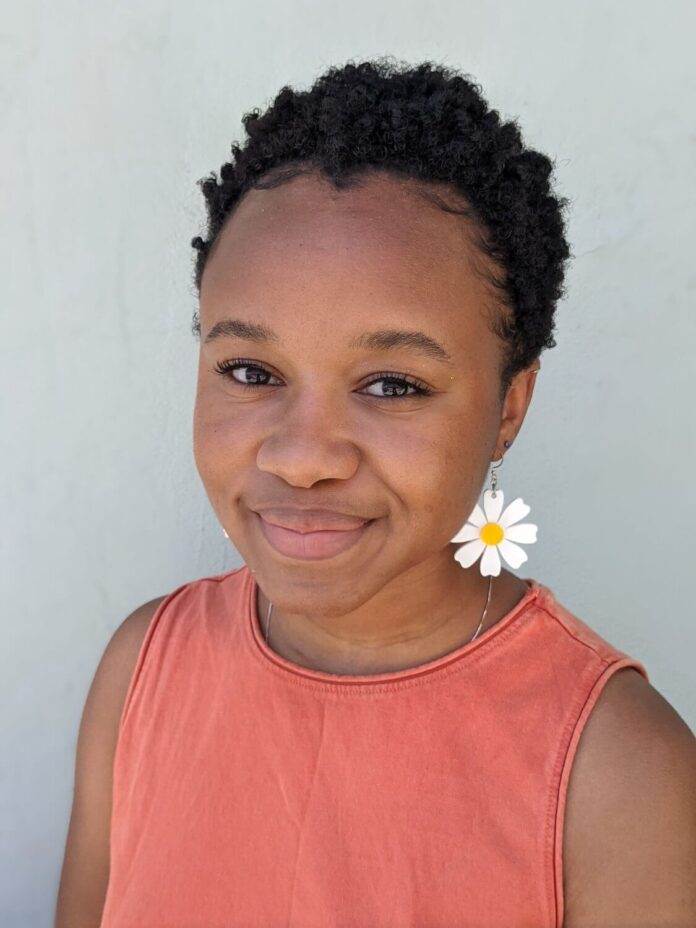Sunari Weaver-Anderson (junior) was featured this September in writer Roxane Gay’s blog, The Audacity. Weaver-Anderson’s piece, “Not Your Gilmore Girl: A Meditation on Being Mothered,” is part of Gay’s Emerging Writer Series. Gay is a New York Times bestselling author who has taught at Occidental. Weaver-Anderson wrote a draft of the piece while taking Gay’s spring 2022 course, “Special Topics in Critical Theory and Social Justice: Writing Trauma” at Occidental.
Weaver-Anderson is a politics major from Richmond, CA who is a Barack Obama Scholar and a member of Occidental’s Diversity and Equity Board (DEB) and Oxy Law Society. Weaver-Anderson’s poetry was previously published by Nomadic Press in “Quip: An Anthology of Young Queer Writing” in 2018, and she self-published “Firebirds” in 2020 as a collection of closet drama plays.
Weaver-Anderson said she is still speechless about being spotlighted in Gay’s newsletter, and that she will forever be ecstatic and extremely grateful.
“It feels very unreal, even now,” Weaver-Anderson said. “Thinking about being a 14-year-old girl who had just started writing, I never would’ve thought [being featured by Gay] would happen.”
Weaver-Anderson said “Not Your Gilmore Girl” is about her multifaceted relationship with her mother in relation to the idealized mother-daughter relationships portrayed in many TV shows — namely “Gilmore Girls.”
Weaver-Anderson highlights various scenes from “Gilmore Girls,” comparing the interactions of the show’s characters to her own interactions with her mother. She describes difficult memories with her mother during her adolescence, focusing on her mother’s reactions and how they differed from the happy resolutions of mother-daughter duo Lorelai and Rory in the TV drama.
She said that most media portrays parent-child relationships as unbreakable bonds, making them appear like a connection between best friends.
“Obviously, I love [my mother] very dearly, but we also have a complicated relationship,” Weaver-Anderson said. “I wrote a piece in which I talk about the ways I tried to seek out that fantasized relationship for myself, but also the ways in which it wasn’t attainable for me.”
Weaver-Anderson said her piece took shape in Gay’s class, where she was constantly getting feedback from her peers and being challenged by her professor to voice the ideas in her mind. Weaver-Anderson said taking the class was a humbling experience, both because Gay found her work valuable and because of the opportunity to take a class and receive feedback from someone with the literary renown of Gay.
“I have so much gratitude and excitement toward the initial process of editing it and sharing it with the people in that class,” Weaver-Anderson said.
Nathan Tam (senior), who is also a member of DEB and a 2022-2023 Barack Obama Scholar, said he has had the privilege to witness Weaver-Anderson’s success as a writer. Tam said he got to know Weaver-Anderson outside of DEB and on-campus activities and that her personal values are apparent in her work. Tam said that Weaver-Anderson’s drive to support marginalized communities and social justice movements, coupled with her thoughtful, reflective personality, enhances her writing.
“[Weaver-Anderson] is just such a great writer — very eloquent, very beautiful,” Tam said. “I think [“Not Your Gilmore Girl”] is a very vulnerable piece that she is brave enough to share. I think a lot of people feel that they’re able to open up to her because of the thoughtfulness that she brings into the spaces she’s in. It helps other people feel the space is welcoming.”
Deandre Ortiz (junior), also a Barack Obama Scholar, said he got to know Weaver-Anderson both through the Barack Obama Scholars Program and the 2022 Urban and Environmental Policy Institute (UEPI) Summer Internship Program. According to Ortiz, Weaver-Anderson is a genuine and authentic person. Ortiz said he is so proud of her driven and passionate work.
“Being a student of color, especially a low-income student of color, it means a lot to see somebody like me succeed,” Ortiz said. “I think that everything she does is from a special place within her. It comes from the heart.”
Weaver-Anderson said she wants to push herself to dabble in different writing genres and hopes to challenge herself to write every day — a practice Gay encourages. Weaver-Anderson said her future writing will reflect more of her personal experiences and will continue to serve as her creative outlet, regardless of any future time limitations.
“I continue to grapple with this idea of how to be creative, while also being pragmatic,” Weaver-Anderson said. “I love to explore writing, I really do. I want to push myself to write more for me.”
Contact Anna Beatty at beatty@oxy.edu
![]()































